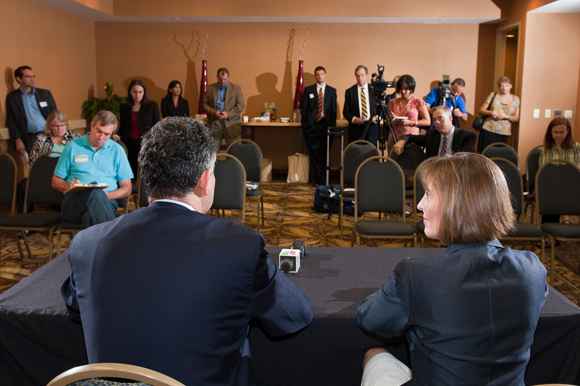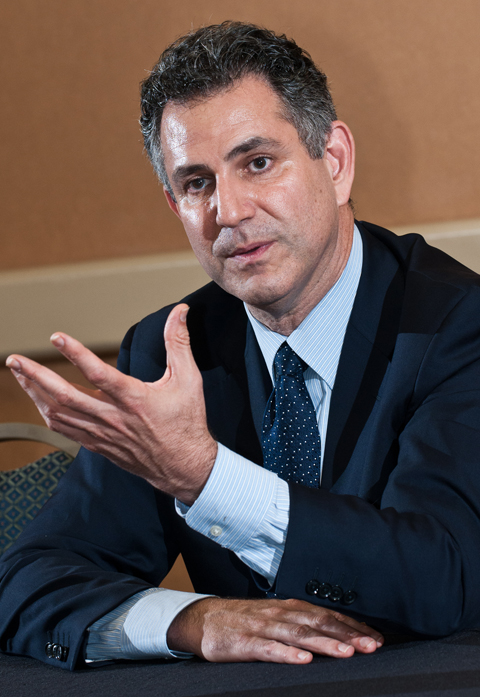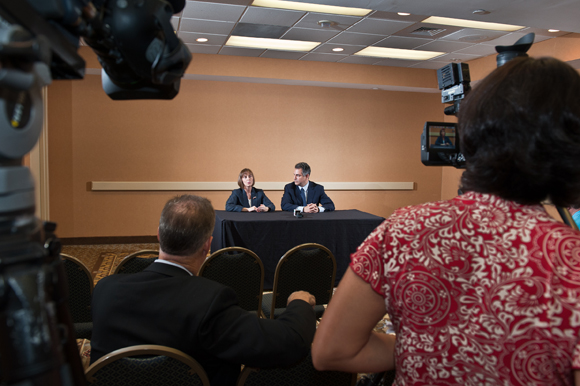Q&A: Francisco “Frank” Sanchez, Tampa
As U.S. Under Secretary of Commerce for International Trade, Tampa native son Francisco “Frank” Sanchez travels the world to discuss opportunities to increase U.S. exports and create jobs for Americans. He was back in Tampa in August to meet with business, academic and community leaders interested in learning more about the National Export Initiative and how increasing exports can help fuel America’s economic recovery. He and Congresswoman Kathy Castor of Tampa work closely together on issues such as travel and trade with Cuba.
Tampa’s own Francisco “Frank” Sanchez, U.S. Under Secretary of Commerce for International Trade, led Tampa Bay area business leaders in a round-table discussion about President Obama’s National Export Initiative at an August 20 gathering sponsored by the Tampa Trade and World Affairs Council. He sat down afterward with 83 Degrees to talk about expanding trade opportunities and what the Commerce Department is doing to help prepare U.S. businesses to increase exports.
83D: What are the Tampa Bay region’s greatest assets for international trade?
FS: Infrastructure. Tampa has one of Florida’s largest seaports, Tampa International Airport and two major Interstate highways (I-4 and I-75) leading into and out of the region. Second, USF. The University of South Florida is emerging as one of the nation’s major research institutions and incubators for innovation. Third, a diverse and well-educated workforce. People from all over the globe live here, come here for education and speak the languages of the world. The Tampa Bay area is a vibrant exporting community with a broad range of products being shipped overseas and great potential to do more.
83D: Where are the greatest opportunities?
FS: Opportunities to grow exports are everywhere with 95 percent of the world’s consumers living outside the U.S. and 87 percent of the world’s economic growth in the next five years expected to happen outside the U.S. The greatest potential lies in trade with emerging nations, particularly in getting Congress to approve pending trade agreements with Panama, Korea and Columbia.
83D: Name three things that arose in today’s discussion that could be improved to enhance trade?
FS: 1. Access to credit. It’s a problem for companies that genuinely want to export. Some of the things government does don’t help. We’re working with ExIm Bank (Export-Import Bank) and the SBA (Small Business Administration) to make lending programs more accessible. Private lenders also need to get involved. Banks can no longer rely on real estate alone to boost profits. Growth in emerging markets present outstanding opportunities for investments.
2. Issues related to being designated a hazardous product. The designation brings all kinds of unfortunate ramifications. We need to make sure regulations do what is needed to protect public health, but in doing so we have to guard against going beyond what is necessary.
3. Access to business visas. Once a contract is signed and a product is sold, there is often a need for training people in another country how to use or repair the products. We’re working with Homeland Security and the State Department to eliminate unnecessary delays in granting business visas.
And 4. Protecting intellectual property. This is particularly a problem in emerging markets where enforcement is lax. We’re trying to shine a spotlight on problem areas and to encourage foreign governments to step up regulations and enforcement.
83D: Which industry sectors offer the greatest potential for increased trade?
FS: Companies that can provide goods and services that help build infrastructure have lots of opportunities. Countries around the world are looking to build so there is a need for architects, engineers, construction workers, high-end telecommunications, etc. — everything related to growth and development.
USF, as a nationally ranked research institution, can help realize great potential for exporting of high-value R&D (research and development) by formalizing a structure for exports with an eye toward the global market. Business plans emerging out of USF should include the world as a potential market right from the very beginning.
Geographically, businesses in the Tampa Bay region should be looking more at opportunities for trade in Latin American and Caribbean countries. The language abilities in Tampa’s diverse population give the region an advantage.
Finally, Delta’s announcement about direct flights from Tampa to Cancun is great news. More direct international routes connecting the region to the world would be better.
Let me underscore again: Exporting is no longer an option for any business that has an exportable good or service. Tampa’s roots are the blueprint for its future. To be successful in the future, businesses must look not at a market that encompasses only the region or the state or the U.S. They must look at their market as a global market. Every day I hear from businesses that reached out globally before the recession and are realizing the benefits today. U.S. businesses that once did 30 percent of their business overseas are now doing 50 percent or more and are now sometimes seeing their profits coming from overseas. Many have said that without today’s overseas business, they would be out of business. Those who get into exporting now will realize a bright future.
83D: What parts of the world are ripest for U.S. exports?
FS: The International Trade Administration is focused on emerging markets because that’s where the growth is: China, Brazil, India. Also places like Vietnam, Saudi Arabia and Qatar.
83D: What else can the U.S. do to better prepare businesses for getting into exports?
FS: My primary job is to double exports in five years. So far we’ve seen $11.5 billion in export contracts signed from January to August. That’s 70,000 American jobs. If we want companies to do well abroad, they need to do well here. We are working to be a strong voice within the policy-making process to help make American businesses stronger domestically and more competitive globally while helping to open up and expand emerging markets.
83D: What advice would you offer today’s incoming college freshmen about what to study to prepare themselves for 4-10 years in the future?
FS: Learn another language. Also, apply for internships with companies that are already into exporting. Learn how it’s done and educate yourself about the world. Talented, bright young people who start early on to think globally will be better prepared to enter the workforce.
Diane Egner, 83 Degrees publisher and managing editor, shares insights from thought leaders by conducting interviews and editing their answers for succinctness. Comments? Contact 83 Degrees.















